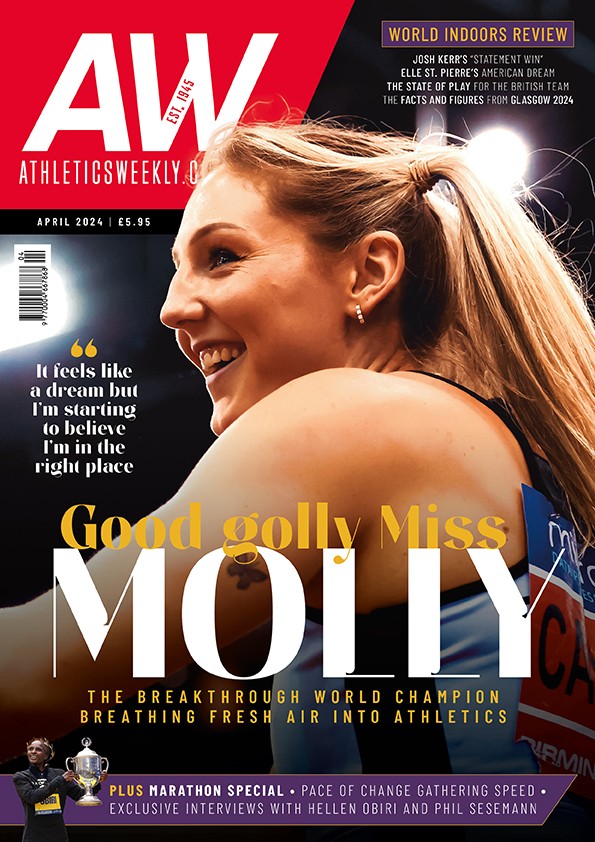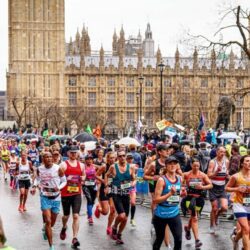It’s often said that to succeed in sport you need to choose your parents carefully, but is having champions as parents a blessing or a curse? Eilish McColgan gives her views
From a young age, I was engulfed in athletics. All I remember is growing up in an environment surrounded by two international athletes. My mum, Liz, was 1991 world champion at 10,000m and an Olympic silver medallist and dad, Peter, was Northern Ireland steeplechase record-holder, so I spent hours and hours of my early years trackside in a pram. To many people, it was a given that this would be my chosen sport and that, “gifted with the genetics”, that I was effectively born to run.
But, it’s not that straightforward. Speaking to contemporaries who are in a similar situation to me, I realise how being blessed with good genes can potentially be offset by other pressures that come with having parents who have reached the top level in sport.
External pressures
In a lot of ways, having parents who have dealt with the ups and downs of competitive sport at any level is as much of a determinant as genes. If they can pass on what they have learned from life, then it can help with focus and direction. There was never any pressure for me to run, but in the final year of primary school, my PE teacher added my name to the cross-country team largely because I was a McColgan. After my race, I went back to the PE hall to retrieve my bag to find my mum was surrounded by a crowd of people getting autographs and taking pictures. I found the whole situation bizarre – it was the first indication I had that she was something special.
After that race, I qualified for the Scottish Schools Cross Country Championships. It was a huge step up in competition considering I had never done any sort of running before. Although I was out of my depth, I finished respectably – in the top five, I think, in one of the races. I came away with a huge smile on my face but, as I walked past some of the other kids who finished ahead of me, I could hear their parents congratulate them for beating “Liz McColgan’s daughter”. It was a phrase I became used to hearing all throughout my junior years. People expected me to do well, all because of who my parents were. Thankfully, my parents’ attitude meant I never felt a huge weight on my shoulders. I loved running, blocked out whatever comments I heard and did the best I could possibly do.
In the spotlight
In a race at those Scottish Schools championships, a young girl called Lynsey Sharp dominated the field. Little did I know that almost 14 years later we would both be 2012 Olympians and we made our second Olympic appearances together in Rio.
After that schools race, local and national photographers huddled us in front of our mothers for the next day’s newspapers. Like me, Lynsey was the daughter of two high-achieving athletes – Commonwealth Games medallist Cameron Sharp and Commonwealth Games representative Carol Sharp (née Lightfoot).
I’ve often wondered if she had felt the pressure of living up to their success, or whether she was unaware of it as I had been. “When we first raced at those schools races, it became a big story,” Sharp says. “That was my first feeling of any sort of pressure to do well or that people were expecting me to be a good runner because of who my parents were.
“But to be honest, it never got out of control. I never went to the start line thinking, ‘Oh god, I have to do well here because of who my parents are.’ I was there because I loved running and competing.”
Lack of pressure
Coming through the age-group ranks, I was never the best and I was beaten a lot. Those losses caused a lot of tears and tantrums, but my mum was always careful to keep me in check. “Junior performances mean nothing,” she used to say. “Keep working and you’ll make it as a senior.”
I used to hate hearing those words. I was so impatient. I wanted to run fast then, not in 10 years’ time. They held me back from training too much, not wanting to burn me out – yet people would blast her as the ultimate pushy mother.
In reality it was never an expectation that I would run and I think this has been key to the lack of pressure I have felt over the years. My four younger siblings haven’t had the same exposure to the sport as I did, as our parents had retired by then. It probably explains why they don’t have the same passion for it. They are extremely talented – two of my brothers recently won both their area cross-country and track championships despite neither of them doing any form of movement other than manipulating the buttons of a Playstation console – yet they choose not to train or compete and my parents respect them for that.
Living up to success
It’s become a fixation of TV and print journalists who bring it up repeatedly. They expect to hear how traumatic it was for me to withstand the stress of trying to meet my mother’s success. But it’s never been about winning a family battle. Recently we’ve joked about me breaking mum’s family records, but running as fast as she did is not something that has been continually pressing on my shoulders for years. Ironically, I only realised how close I was to my mum’s personal best times because, you guessed it, a journalist brought it to my attention.
As athletes, my parents and I are completely separate entities and living in very different generations. I’ve had a lot more injuries and illnesses throughout my career than my mum did and, because of that, our training programmes are starkly different.
Opening doors
One misconception is that doors in sport are opened more easily if you have well known parents, but I feel I have a tougher battle breaking them down. People often expect more of me because of my family name. Every negative comment or setback I’ve received has motivated me further.
Lynsey echoes this sentiment: “I think I have achieved enough now that people will say I’m a good athlete in my own right as opposed to just riding on genes and talent,” she says. “I have good genes and it’s been very helpful, but I’ve had to put in a lot of hard work, just like every other athlete to get to where I am today.”
Despite all of this, I understand why the interest in my achievements and the comparisons with my parents persists. Only last week I was asked by a journalist, “Do you feel the pressure?” It won’t be the last time I hear it.
Thankfully, at the age of 25, I still don’t feel the sporting burden that many people may expect me to and doubt I ever will. I’m proud to be a McColgan. Growing up alongside my parents and seeing how hard they worked to try to achieve their dreams makes me even more determined to achieve my own. I go to bed every evening, stress-free, knowing that every time I lace up my trainers I’m making them extremely proud.
WINNERS IN THE GENE POOL LOTTERY
» Jake Wightman: Achievements: 7th over 1500m at the European Championships, Commonwealth Games 2014 representative 1500m and European junior gold in 2013.
Parents: Geoff Wightman: 8th in the marathon at the Commonwealth Games 1990, 6th at European Championships Marathon 1990. Susan Tooby: 6th in the 10,000m at the 1986 Commonwealth Games, 12th over the marathon at the Seoul Olympic Games and 20th at the European Championships.
» Harriet Knowles-Jones: Achievements: 4th at the World Youth Championship over 1500m in 2015 and 2nd at the European Cross Country Championships. UK School Games gold over 3000m in 2014.
Parents: Jayne Spark: UK 1500m title in 1993, represented Great Britain at the World Student Games and the World Cross Country Championships. Martin Jones: 4th over 10,000m in the Commonwealth Games in 1994, World Mountain Running champion.
» Hannah Nuttall: Achievements: IAAF World Cross Country Championships representative in 2015. English Schools champion over 3000m in 2014.
Parents: Alison Wyeth: represented Britain at the Olympic Games in 1992 and 1996 and three World Championships, finishing 5th in the 3000m final at the 1993 World Championships. 3rd in the 3000m at the Commonwealth Games in 1994. John Nuttall: Atlanta Olympic Games 1996 5000m representative, Commonwealth Games 3rd place in 1994, two-time World Championships representative and five times at the World Cross Country Championships, 1st at the 1989 NCAA Division I Cross Country Championships.
» Finley Bigg: Achievements: 2016 England Schools champion over 800m. 3rd over 400m indoors at the South of England U20/Senior Championships.
Parents: Sally Gunnell: 1992 400m hurdles Olympic gold, 1993 World Championships gold and world record-holder, 1994 European Championships gold, 1986, 1990 and 1994 Commonwealth golds. Jon Bigg: International junior vests over the 800m with a personal best of 1:48.40.
» Eilish McColgan reached the final of the 5000m at the Rio Olympics and competed in the 3000m steeplechase at the London Games of 2012














